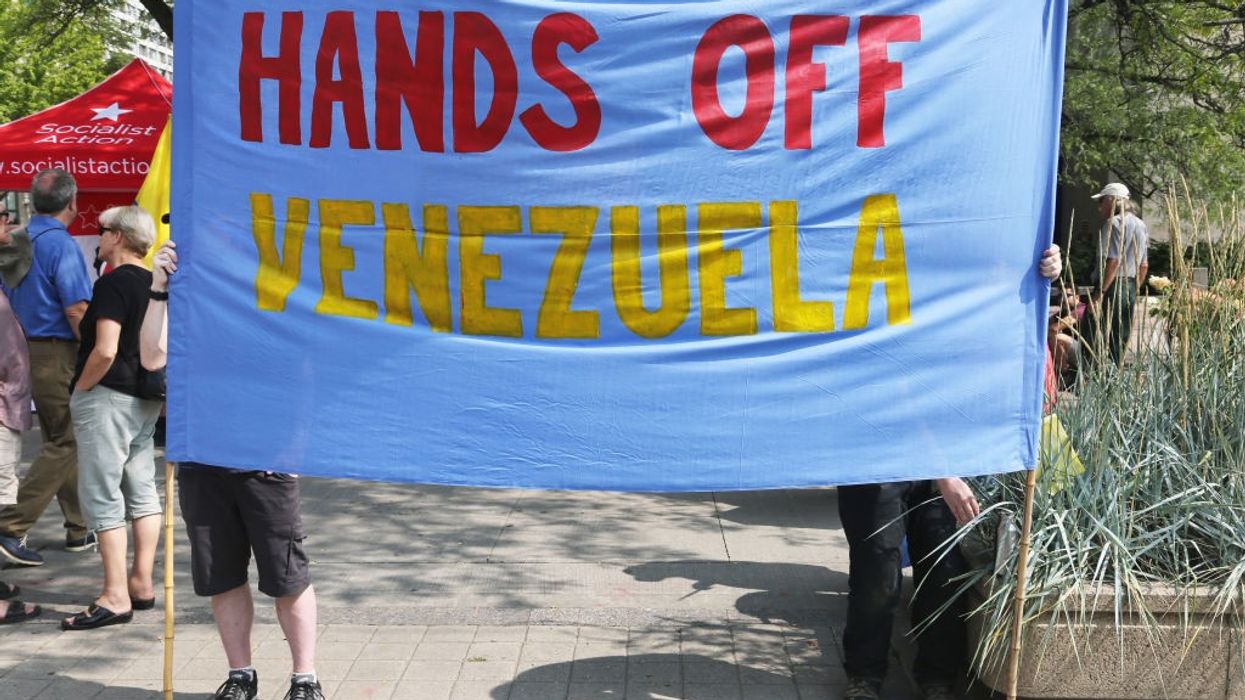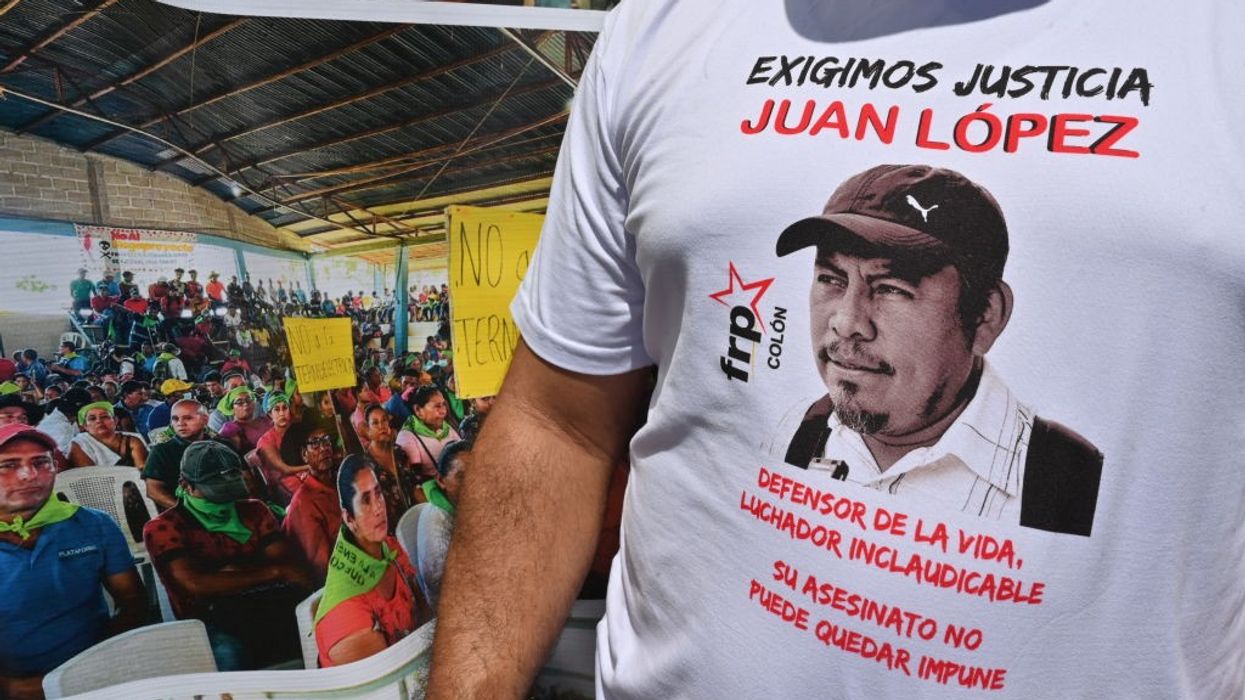History Shows Why the US Must Leave Venezuela Alone
To fully understand Washington’s current warpath in the region, it’s necessary to revisit earlier episodes in which the US intervened, violently and anti-democratically, to shape the political destinies of countries in the hemisphere.
In recent months, the Trump administration has escalated a decades-long campaign against the Venezuelan government and people. The renewed, intensifying threats of regime change, justified through false or inflated claims that Nicolás Maduro, its president, is directing narco-terrorism against the United States, serve as a convenient pretext for deeper and more direct intervention.
A recent wave of extrajudicial killings at sea, the directing of the CIA to launch covert ops inside Venezuela, the surge of US troops into the Caribbean, the reopening of a long-shuttered naval base in Puerto Rico, and the deployment of the aircraft carrier the USS Gerald Ford in the region represent striking but not surprising developments. These are little more than the latest expression of an ideological project through which Washington has long sought to shape the hemisphere in ways that would entrench US power further and protect the profits of Western multinationals.
That formal project dates back to at least the 1823 Monroe Doctrine, when the US unilaterally claimed Latin America as its exclusive sphere of influence. Its revival today is unmistakable and distinctly dangerous. As Secretary of Defense Pete Hegseth declared, echoing the language of that two-century-old policy, “The Western Hemisphere is America’s neighborhood, and we will protect it.”
The results of that doctrine have long been clear: immense profits for the few and violence, political upheaval, social dislocation, and economic devastation for the many. While Washington’s imperial desires in the hemisphere have long been met by movements challenging US dominance, these have repeatedly been forced back into the subordinate position assigned them in a global capitalist order designed to benefit their not so “good neighbor.”
When Hugo Chávez completed the nationalization of Venezuela’s oil sector in 2007, he followed a long and perilous trajectory established by regional leaders who dared to confront US power.
It’s no accident that, by the mid-1970s, Latin America had been transformed into a hemisphere dominated by US-backed right-wing authoritarian regimes. Entire regions like the Southern Cone became laboratories for repression, as Argentina, Bolivia, Brazil, Chile, Paraguay, and Uruguay formed a coordinated bloc of military juntas. With direct support from Washington, those regimes oversaw what came to be known as Operation Condor, establishing a transnational network of state terror. Its consequences were catastrophic: 50,000 killed, tens of thousands “disappeared,” and hundreds of thousands tortured and imprisoned for the so-called crime of harboring real or perceived leftist sympathies.
During that earlier period, Venezuela had been largely spared the brutal excesses of direct US interventionism in the region (due in part to the repressive rule of successive US-supported strongmen Juan Vicente Gómez and Marcos Pérez Jiménez). That changed in 1998, when Hugo Chávez, Maduro’s far more popular predecessor, became president and pursued policies of popular sovereignty and resource nationalism aimed at ensuring the nation’s vast oil reserves (the largest in the world) served Venezuelans rather than being siphoned off to enrich foreign corporations. From then on, Venezuela became the latest target of Washington’s efforts to undermine, discipline, and ultimately neutralize “troublesome” progressive governments across Latin America.
To fully understand Washington’s current warpath in the region, it’s necessary to revisit earlier episodes in which the US intervened, violently and anti-democratically, to shape the political destinies of countries in the hemisphere. Three cases are especially instructive: Cuba, Guatemala, and Chile. Together, they illuminate the long arc of US imperialism in Latin America and clarify the dangers of the present confrontation.
The Rise of Plattismo in Cuba
Cuba had long been a crown jewel in Washington’s imperial imagination. By 1823, American political elites were already casting the island as essential to the future of the United States. President John Quincy Adams, for instance, described Cuba, then a Spanish colony, as “indispensable” to the country’s “political and commercial interests.” He noted ominously that, should the island be “forcibly disjointed from its own unnatural connection with Spain and incapable of self-support,” it could “gravitate only towards the North American Union.” Thomas Jefferson similarly maintained that the possession of Cuba was “exactly what is wanting to round out our power as a nation.” In that spirit, during the 1840s and 1850s, Presidents James Polk and Franklin Pierce sought to purchase Cuba from Spain, overtures that were repeatedly rejected.
Those efforts unfolded during a period of rapid US territorial expansionism, marking a time when Washington regarded continental conquest as both a “providential destiny” and a political and economic imperative. When ostensibly legal mechanisms like land purchases could be invoked, they were embraced. When military force offered a more expedient path to territorial acquisition, as with the war of aggression that stripped Mexico of half its territory and delivered what became the American Southwest to US control in 1848, it was undertaken with little hesitation.
The opportunity to pursue longstanding ambitions in Cuba and inaugurate the US as an overseas empire arrived with the Spanish-American War of 1898. In that conflict, Washington intervened in anti-colonial uprisings from Puerto Rico to the Philippines, not to champion genuine liberation but to ensure that any subsequent “independence” would be subordinated to US strategic and economic interests. What emerged was a political order deliberately engineered to keep Cuba firmly tethered to the priorities and power of the United States.
That would be codified in the 1901 Platt Amendment, which effectively nullified Washington’s earlier assurances of Cuban sovereignty and granted Washington the right to establish military bases (including Guantánamo), substantial control over the Cuban treasury, and the ability to intervene whenever the US deemed it necessary to safeguard its arbitrarily defined notion of what constituted “Cuban independence” or to defend “life, property, and individual liberty.”
In practice, Cuba emerged from the war as a dependent protectorate, not a sovereign nation. That model was soon codified for the entire hemisphere with the Roosevelt Corollary to the Monroe Doctrine issued in 1904, which granted the United States a self-appointed mandate to police the region to maintain “order.”
In Cuba, that arrangement would serve Washington’s interests for decades. By 1959, on the eve of the Cuban Revolution, US corporations controlled 90% of the island’s trade, 90% of its public services, 75% of its arable land, and 40% of its sugar industry. Meanwhile, the vast majority of Cubans remained landless, disenfranchised, and mired in poverty.
By breeding staggering inequality, Washington’s imperialism rendered Cuba ripe for revolution. In 1959, following years in exile, Fidel Castro returned to the island to overwhelmingly popular support, having launched an armed struggle after attempting to run in the 1952 elections that the Washington-backed Cuban leader Fulgencio Batista cancelled. Rather than confront the policies that had produced the revolution, US officials moved to make an example of Castro, waging an obsessive campaign to undermine his revolutionary government and punish the population whose support had made his ascent possible.
Washington pursued everything from ill-fated invasions to assassinations, plots that, in October 1962, brought the world to the brink of a nuclear holocaust. It also imposed a punishing economic blockade designed to choke the island’s economy, render socialism a stillbirth, and deter other nations from challenging US hegemony. Those efforts foreclosed the possibility of constructive engagement, which Castro had initially signaled he was open to, pushing Cuba decisively into the Soviet orbit, and creating the very outcome Washington claimed it had sought to avoid.
The Fall of Guatemala
Castro did not return to Cuba alone. He arrived alongside the Argentinian Ernesto “Che” Guevara, who would become a key ideologue of the revolution, bringing with him a commitment to constructing a global, anti-imperialist movement. The two first met in 1955 in Mexico City, where Castro was organizing in exile and Guevara had resettled after working as a doctor in Guatemala, a country he had entered to support the democratic spring of President Jacobo Árbenz.
The democratic experiment in Guatemala was abruptly and violently extinguished in 1954, when a US-backed coup toppled Árbenz. From that experience, Guevara carried with him an indelible lesson about the reach of US power and Washington’s willingness to deploy force in defense of corporate interests, along with the profoundly antidemocratic and destabilizing consequences of US intervention across the hemisphere.
That coup in Guatemala was carried out in service to that country’s real center of authority, the Boston-based United Fruit Company. Founded in 1899, United Fruit consolidated its foothold there through a series of preferential corporate arrangements, as successive strongmen ceded vast tracts of land and critical infrastructure to the company in exchange for personal enrichment. In the process, Guatemala was transformed into the archetypal “banana republic.”
If Guatemala exposed Washington’s readiness to destroy a modest social democracy in the name of communism and in defense of corporate power, Chile demonstrated the full, violent maturation of unrepentant Cold War interventionism.
United Fruit came to dominate Guatemala’s agricultural and industrial sectors, transforming itself into one of the most profitable corporations in the world. It secured extraordinary returns through its monopoly power, wage suppression, and the criminalization of labor organizing. Its influence extended into the highest levels of Washington. Secretary of State John Foster Dulles had represented United Fruit as a senior partner at the law firm Sullivan and Cromwell, and his brother, CIA director Allen Dulles, had previously served on that company’s board.
Árbenz regarded United Fruit not just as a threat to Guatemala’s sovereignty but also as an engine of injustice. In a country where 2% of the landholders controlled 72% of all arable land (more than half controlled by United Fruit), much of it left deliberately fallow, he sought to challenge a system that denied millions of peasants access to the land on which their survival depended. His land reform program applied only to uncultivated land. The government proposed purchasing idle tracts at their declared tax value (based on the company’s own assessments). Yet because United Fruit had systematically undervalued its vast land holdings to evade taxes, the company refused.
Árbenz’s policies, driven by the fact that he was a nationalist (not a communist), were committed to dismantling Guatemala’s imperial dependency. His objective was to transform, as he put it, “Guatemala from a country bound by a predominantly feudal economy into a modern capitalist state, and to make this transformation in a way that will raise the standard of living of the great mass of our people to the highest level.” Yet, in the ideologically charged climate of the early Cold War years, such New Deal-style reforms were recast by Washington as incontrovertible proof that a “Soviet beachhead” was taking root in Central America.
By 1954, US officials insisted that they had “no choice” but to intervene to prevent the country from “falling” to communism. The subsequent coup relied on an orchestrated propaganda campaign, the financing of a mercenary army, and the aerial bombardment of Guatemala City. The combined pressure of all of that coerced Árbenz into resigning. In his final address, he condemned the attacks “as an act of vengeance by the United Fruit Company” and stepped down in the hope, quickly dashed, that his departure might preserve his reforms.
Power would soon be transferred to the military regime of Carlos Castillo Armas, while US President Dwight D. Eisenhower triumphantly proclaimed that “the people of Guatemala, in a magnificent effort, have liberated themselves from the shackles of international Communist direction.” In reality, United Fruit had expanded its influence, while the country descended into decades of state terror. The civil war that followed claimed more than 200,000 lives, including a genocidal campaign against the Indigenous Ixil Maya people, carried out with direct US support.
The Crushing of Chilean Socialism
If Guatemala exposed Washington’s readiness to destroy a modest social democracy in the name of communism and in defense of corporate power, Chile demonstrated the full, violent maturation of unrepentant Cold War interventionism. When the socialist physician Salvador Allende won the presidency in 1970 in a democratic election, Washington immediately went on the warpath, launching a covert, sustained campaign to strangle his government before it could succeed.
Allende sought to expand social welfare and democratize the economy. His program called for the nationalization of strategic industries, the expansion of healthcare and education, the strengthening of organized labor, and the dismantling of entrenched monopolistic landholdings. Those initiatives drew support from a broad, multiparty alliance rooted in Chile’s peasants as well as its working and middle classes. Above all, Allende’s agenda aimed to reclaim the nation’s mineral wealth from foreign capital, especially the US-based copper giant Anaconda, whose staggering profits bore few meaningful returns for the Chilean population.
President Richard Nixon and National Security Advisor Henry Kissinger found that intolerable and quickly came to regard Allende not just as a symbolic but a real threat to US power in the region. After all, a successful socialist state achieved through the ballot box risked demonstrating that another political and economic path was indeed possible.
What followed was a coordinated campaign of economic, social, and political destabilization. The CIA funneled millions to Chile’s opposition parties, business associations, and media outlets. It financed strikes and disruptions designed to create and weaponize scarcity, to (in Nixon’s words) “make the economy scream” and erode confidence in Allende’s Popular Unity government. US officials also cultivated ties with reactionary factions in the Chilean military, encouraging coup plots and ultimately directly supporting the overthrow of Allende on September 11, 1973.
What emerged was one of the bloodiest dictatorships in the hemisphere in the 20th century. General Augusto Pinochet’s regime would carry out widespread torture, disappearances, and extrajudicial killings, while US-trained economists imposed radical neoliberal policies (similar to the failed ones now being implemented by Javier Milei in Argentina with the help of a Donald Trump bailout) that dismantled social protections and opened Chile’s economy to foreign capital.
Hands Off Venezuela
In every instance where the United States intervened in Latin America, leaving tens of thousands dead and entire societies destabilized, it was never really communism that Washington feared. What alarmed policymakers and the corporate interests they served was the prospect that nations in the hemisphere might escape the economic architecture of US dominance.
When Hugo Chávez completed the nationalization of Venezuela’s oil sector in 2007, he followed a long and perilous trajectory established by regional leaders who dared to confront US power. In doing so, they committed what Washington considered the “cardinal sin” of asserting sovereign control over national resources within a hemisphere it had long treated as its strategic preserve. These leaders demonstrated, however briefly, that it was possible to stand up to the United States, but that such defiance would ultimately be met with overwhelming force.
Independent powers in this hemisphere going their own way were the threat that Washington and Wall Street could never tolerate. It’s the same reason the United States is once again maneuvering toward open conflict in Venezuela. To proceed down such a path will, of course, mean reenacting some of the most catastrophic chapters of US foreign policy. The lesson of such imperial adventurism in Latin America is unmistakable. When Washington interferes in other nations, the outcome is never stability or democracy but their absolute negation.


